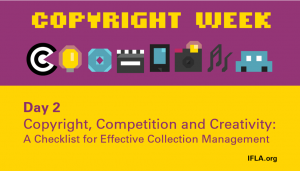Earlier this year, we published a blog looking at the degree to which competition law and policy could provide a useful lens for analysing the current state of markets for electronic content for libraries.
As highlighted in the blog, the prices and terms that libraries face for electronic content raise serious concerns about the sustainability of current levels of service to library users.
The blog suggested that further analysis from a competition perspective could be helpful, not so much at the level of individual companies, but rather to address wider practices that can see libraries limited in their ability to provide services.
This is the task of broader market investigations or studies, such as those carried out by the UK’s Competition and Markets Authority. Indeed, the American Library Association has made a submission to an ongoing review on digital content markets, highlighting concerns about the behaviour of platforms and publishers alike
A parallel approach can be to look at libraries as consumers, and what consumer law can offer us in terms of arguments or angles to explore.
Normally, we think about consumer law as referring to the protections in place to ensure that individuals are not mistreated by companies that sell products or services to them, benefitting from a situation of grater market power or information.
It covers issues such as rights when such products are defective, or when a consumer has been misled about what they are buying. We benefit from consumer law when we have the possibility to change our minds, or when we receive compensation when something goes wrong. This is particularly powerful when contacts for services are effectively non-negotiable.
Yet, to the extent that consumer law tries to respond to situations where the seller has the upper hand in terms of information or power, there are ideas in consumer law which can certainly seem applicable to the situation of libraries.
This imbalance, combined with the extensive copyright protections offered to rightholders, mean that libraries often face a hard choice between unfavourable terms and no access at all.
For example, a number of common law countries introduce the concept of ‘unconscionable’ contract terms (for example, Australia), referring to provisions which are not just unfair, but against the norms of society.
It could be argued, here, that if norms of society are set out in limitations and exceptions to copyright (for example, the importance of educational uses, of preservation and of criticism or quotation), then contract terms that override these, building on an imbalance in negotiating power between rightholders and consumers, are indeed questionable.
Outside of the common law world, in the European Union, there have also been efforts to address the question of unfair terms, with a 1993 Directive already setting out that a contract cannot be considered fair when the supplier is allowed unilaterally to change the content of the product or service offered.
In this case, we can perhaps point to the evidence of eBooks and other materials disappearing from bundles to which libraries subscribe. This was studied in depth in 2015, but stories continue to circulate underlining that it may continue to be a problem.
Clearly, as mentioned above, consumer law is primarily focused on individuals. As such, it can appear to be a bit of a jump to consider a library – as an institution – as a consumer.
Libraries themselves are in an odd position – they are not reselling anything, although clearly are giving users access, placing them somewhere between the situation of a business and that of an individual consumer.
The law in some countries does make clear that only individual people can count as consumers, given that anyone operating in a professional capacity can be seen as better able to defend their rights.
However, not all countries operate such an approach, with some extending consumer protections to cover small businesses, for example the Netherlands and Belgium. The same has also happened in Australia and New Zealand (for businesses with a turnover of up to $250 000).
These countries have recognised that an imbalance in negotiating power or information can affect an organisation just as much as individuals. The specific nature of libraries as neither businesses nor individuals makes this approach particularly interesting.
For example, the Belgian law makes it clear that small businesses can also raise doubts about contracts which allow sellers to change the characteristics of what they are selling unilaterally (recalling the situation of missing eBooks and journals).
The Australian law, also, allows for such unilateral changes to be counted as unfair, at least when the buyer is locked into the contract (a situation which may, de facto, be the case for a library acquiring content in order to serve students and faculty).
This blog, in looking at themes that emerge in consumer law, complements previous posts exploring the insights that competition law offers into the way markets for libraires do – or do not – function.
The previous post highlighted the issue that refusals to sell or licence (in particular where these seem designed to encourage the buying of big deal packages) create. It also noted concerns that libraries’ limited margin for manoeuvre faced with expectations from users and faculty put them in a weaker position, and left them susceptible to needing to pay more.
This post adds to this the risks around contract terms which prevent the fulfilment of recognised public interest goals (especially in the case of non-negotiable contracts), and around unilateral changes in packages offered.
There is certainly scope for looking further, from both the competition and consumer policy angles, in order to understand better the challenge facing libraries in a digital marketplace. Comments and links to further materials on the subject are welcome in the comments box below.
